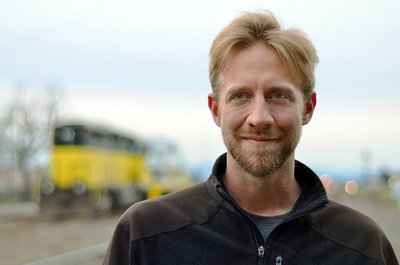
Once upon a time, and not all that terribly far back, Jeff Geiger was undergoing what he now describes as “a dark night of the soul.”
The Eugene writer had arrived at the artistic crossroads. “I’d been working for, I’d say, at least a decade as what I’d consider to be a serious writer,” he says. Deciding that he was most passionate about young adult fiction, Geiger wrote two such novels that came up bust. They had heart, but “they weren’t selling. It was an incredibly frustrating experience,” he recalls.
“I’m looking at my life,” Geiger continues. “I was single. I didn’t have a wife. I didn’t have any kids.”
In 2012, Geiger decided to attend a writer’s retreat in western Washington. He presented his then-current manuscript in a workshop and, “over the course of the weekend, it got eviscerated by my writing group.” Broke, defeated and at wit’s end, he jumped in his car only to have it break down in Purdy, a backwater of a backwater in Washington’s Key Peninsula.
“The mechanic totally fucked up my car,” Geiger says, and he was forced to stay a few days in a roadhouse as he waited on repairs. “So there I am,” he says with a smile. “I’m stuck at this motel, thinking this was a way more interesting premise than what I was working on.”
Newly inspired by the hard-boiled scenario of actually breaking down in the middle of nowhere, Geiger got started on a manuscript entitled Wild Man, the story of a 17-year-old valedictorian whose car breaks down, stranding him for five life-altering days at a roadhouse in rural Washington.
“That book’s the best thing I’ve ever written, no question,” he says. “That was the turning point.”
And yet Geiger remained in a turmoil that was at once artistic and existential. Yes, the writing came with the ease of an artist finally finding his voice, but that voice was speaking in isolation. Still burnt from the writer’s retreat, Geiger had all but given up the idea of publishing.
“I had to finally convince myself that I’d never sell a book,” he explains. “I just decided to finish the book,” after which he sent it to a few friends whose responses were more than enthusiastic.
“The writing I always enjoy,” Geiger says. “It’s all the bullshit around writing that’s hard, so I decided not to engage in all the part that’s outside writing.”
And, for Geiger, who is a co-founder of the improv troupe No Shame Eugene, life went on: work, a new marriage, children.
Fast-forward two years, to 2014, when the writer’s retreat where he felt so savaged the first time came back around. Geiger decided, what the hell, he’d go. “Same car, same road,” he says.
At the retreat, Geiger decided to attend a pitch session, where unpublished writers receive suggestions on how best to market their manuscripts. Opening the door, Geiger beheld a table “full of very eager people” before his eyes fell upon the same agent who was present at that disastrous session two years back.
He turned to leave. She called to him. He tried to excuse himself. She ordered him into the room.
The agent read the first five pages of Geiger’s new manuscript. She asked if he’d sent it to her yet. Geiger told her he hadn’t sent it anywhere. “It’s kinda not done,” he told her. “Every book’s kinda not done,” she said.
The rest is history. Geiger sent the agent his manuscript a week later. In January of 2015 the agent called him from Florida, where she was on vacation, and offered representation. By February the book had sold to Disney Hyperion, who will publish it in 2017. They’ve also contracted for his next novel, sight unseen, which he is currently writing.
Geiger, who is not by nature a dark-seeming or broody guy, still seems a bit in shock about the way Wild Man got picked up. “It was the most surreal, disorienting, exhilarating, nauseating experience I’ve had as an artist,” he says, laughing. “I had truly resigned myself to the fact that I would never sell.”
Henry Miller said it best: “Once you have given up the ghost, everything follows with dead certainty, even in the midst of chaos.” Of course, the cosmic lesson of an artist hitting the skids and giving up only to discover his real and authentic voice isn’t lost on Geiger.
“I thought I’d heard that advice,” he jokes. “I thought I didn’t care, until I actually didn’t care. The most amazing thing for me is it’s so validating to have written my best, most sincere work and have that be the most successful. What I love about it is, I was fighting against my real voice for so long.”